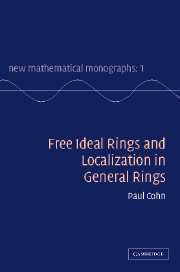Book contents
- Frontmatter
- Contents
- Preface
- Note to the reader
- Terminology, notation and conventions used
- List of special notation
- 0 Generalities on rings and modules
- 1 Principal ideal domains
- 2 Firs, semifirs and the weak algorithm
- 3 Factorization in semifirs
- 4 Rings with a distributive factor lattice
- 5 Modules over firs and semifirs
- 6 Centralizers and subalgebras
- 7 Skew fields of fractions
- Appendix
- Bibliography and author index
- Subject Index
1 - Principal ideal domains
Published online by Cambridge University Press: 22 August 2009
- Frontmatter
- Contents
- Preface
- Note to the reader
- Terminology, notation and conventions used
- List of special notation
- 0 Generalities on rings and modules
- 1 Principal ideal domains
- 2 Firs, semifirs and the weak algorithm
- 3 Factorization in semifirs
- 4 Rings with a distributive factor lattice
- 5 Modules over firs and semifirs
- 6 Centralizers and subalgebras
- 7 Skew fields of fractions
- Appendix
- Bibliography and author index
- Subject Index
Summary
Since the main classes of rings considered in this work generalize principal ideal domains, it seems reasonable to start by recalling the properties of the latter. We begin in Section 1.1 by looking at examples that will be important to us later, the skew polynomial rings, and in Section 1.2 discuss the division algorithm, which forms a paradigm for later concepts. Sections 1.3 and 1.4 recall well known properties of principal ideal domains and their modules, while Section 1.5 describes the Malcev–Neumann construction of the ordered series field of an ordered group, and the Bergman conjugacy theorem. The concluding Section 1.6 deals with Jategaonkar's iterated skew polynomial rings, leading to one-sided PIDs with a transfinite-valued division algorithm. The later parts of Sections 1.5 and 1.6 are not essential for an understanding of the rest and so may be omitted on a first reading.
Skew polynomial rings
Polynomial rings are familiar to the reader as the rings obtained from commutative rings by adjoining one or more indeterminates. Here we want to discuss a generalization that is often useful in providing examples and counter-examples. It differs from the usual polynomial ring K[x] in one indeterminate x over a field K in that k need not be commutative, nor commute with x.
- Type
- Chapter
- Information
- Free Ideal Rings and Localization in General Rings , pp. 60 - 106Publisher: Cambridge University PressPrint publication year: 2006



